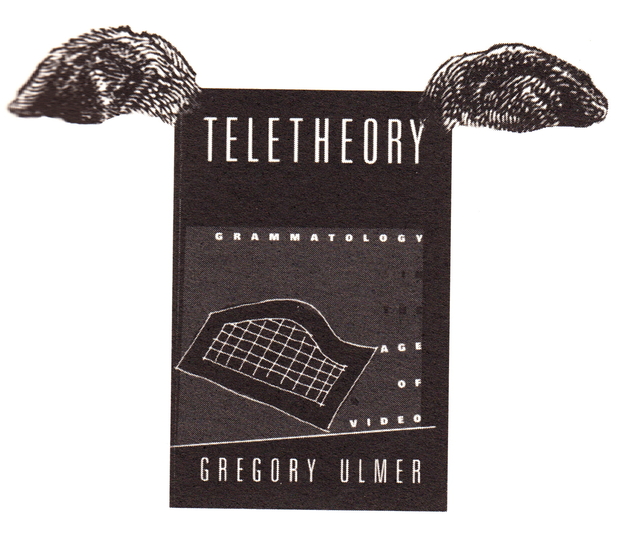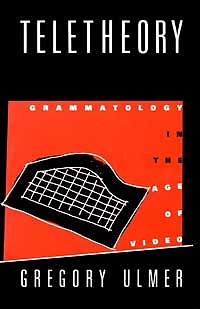His claim is that the humanoria have landed in a language ghetto: discoveries can no longer be made accessible without the use of jargon, the complex rhetoric in which the research itself has taken place. He attempts to find a genre which offers a solution to this problem, thus making it possible for students to become involved in higher-level theory, in roughly the same way as chemistry and small-scale physics experiments provide students with a direct involvement with concepts and theories in the exact sciences.
The new genre envisioned by Ulmer is based on a 'discursive and conceptual ecology', in which the oral, literary and videotic go hand in hand. In the preface, the book is referred to as a guide to the practice of this new genre of 'mystory'. The fascinating thing about Ulmer's approach is that he refuses to theoretically analyse the audio-visual medium. He is interested in using the possibilities of the medium as a 'way of thinking', and combining them with the achievements of oral history and the philosophical-literary tradition of Derrida and Barthes.
Ulmer doesn't advocate throwing difficult words or texts overboard and replacing them with icons, games and historically relevant music videos. In his view, the genre 'mystory' is based on a model which includes the electronic video medium, but which isn't dependent on video technology per se. In a word, the genre is not medium-specific. As evidence of this, Ulmer has included one of his own scripts (Derrida at the Little Big Horn) in which philosophical-literary ideas are interwoven, as in a video tape, with regional history (the place where general Custer was defeated by the Indians) and a sort of personal 'oral history' of Ulmer himself, who had a summer job in the area as a truck driver hauling stones and gravel.
Why edit various genres and kinds of knowledge (philosophical essay, oral history, legend, diary quotes, literary work, art criticism, jokes) as though they were scenes in a video film?
Firstly, because Ulmer assumes that in this way, connections which otherwise would have been obscured by jargon can be described, i.e. 'shown', in a non-theoretical way. Secondly, because his 'mystory' genre sides with those who do not (yet) know what is to be learned: his genre is mainly a way of making connections, of discovering theories and concepts, rather than revealing those which already exist. The inventor as opposed to the trail finder.
Ulmer's model is Roland Barthes' Fragments d'un discours amoureux, in which a theory of love takes the form of a completely open work for which material is provided by personal experience, quotes from literary works, philosophy and psychology.
Thirdly, in the model of video editing, Ulmer sees the possibility of playing with the logic of the subconscious. For example, like Freud, he is convinced that the confusion which can result from homonym or a pun can have a great cognitive effect. Rather than a clearly defined method which consists of a hierarchy of procedural rules, Ulmer advocates an anti-method, in which analogies, the narrative structure of jokes and popular-cultural symbolism can encounter one another. All of these things are not the icing on the cake, not decoration, but a structural component of 'mystory'.
Video montage as a narrative-analytical principle derives its effectiveness from what Ulmer calls a short circuit between various areas in the encyclopedia of knowledge and experience. These moments of short-circuiting produce a 'narrowing down of meaning', a 'bliss-sense'.
Ulmer refers extensively to Derrida, Barthes and especially to Freud, whose theory he sketches as the invention of a genre, by means of the editing of various 'styles' with narrative and logical sequences. In this, the emphasis placed between Hi and Lo culture is noticeable, just as it is in Ulmer's own mystory about Custer's defeat.
The strange thing is that after reading Ulmer's book, one is left with the strong impression of someone with interesting, good ideas, which are in no need of justification in such a roundabout, academic way. A 40-page-long essay together with his own script would have taken a third of the space to do the same work now done by his three-hundred page book. All because Ulmer speaks for academic circles.
Ulmer's problem is that his proposal is in fact liberation from the constrictions of the 'narrowness of the scientific', and a move towards the restoration of the bond between literary-artistic portrayal and intellectual research. This is why he wants to use forms such as oral history and video. His argument is that they offer great advantages educationally. But who is he trying to convince? The classical teachers of the old, scientific establishment may be inclined to give way under the pressure of circumstances and admit that modern media reach students better, but Ulmer's justification for this does not concern the presentation alone. They will vehemently oppose the choice of invention above discovery, the creative element in Ulmer's approach. That is art and not science, they will say, however educational it may be.
There's the rub: Ulmer's 'mystory' is more an intellectual art form, and very interesting as such. His theoretical justification is largely superfluous, because the connections with Barthes, Ponge, Cage and video will be immediately obvious to everyone.
Why is this stimulating book too long, and sometimes difficult to read? This is the result of the fact that saying that students in universities would do better to concentrate on good intellectual art, read essays instead of handbooks, delve into contemporary music and literature and then learn to apply these kinds of methods themselves, in video and writing, in order to gain a better insight into modern historical science, psychology and philosophy – this may all perhaps be true, but is not academically justifiable.
translation Jim Boekbinder

